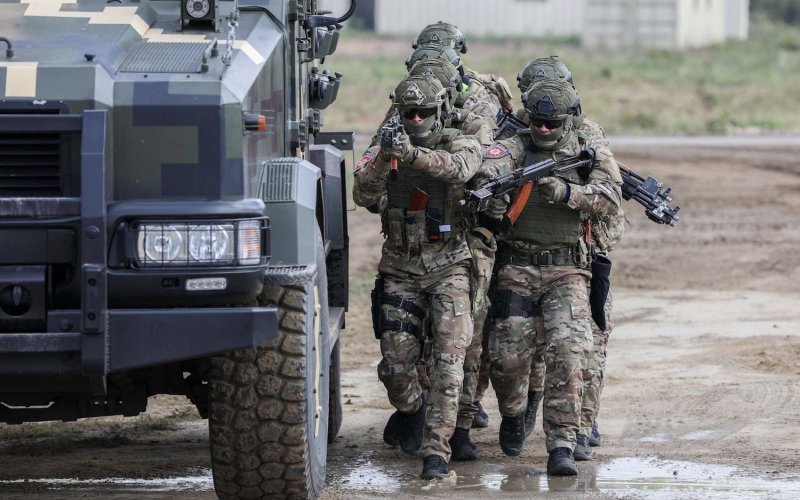Faculty Experts: Rising Tensions over Ukraine

ALBANY, N.Y. (Jan. 28, 2022) – With Russia conducting a massive military buildup along Ukraine’s eastern border, the United States and other European countries have struggled to deescalate tensions with the nuclear power as it demands that Ukraine be banned from joining NATO. The U.S. recently placed as many as 8,500 troops on heightened alert for deployment to Eastern Europe and officials from the Biden Administration have repeatedly warned of severe consequences, including sanctions, should Russia invade Ukraine.
The playbook has been done before. In 2014, Russia seized control of the Crimean peninsula from Ukraine in February and then held a controversial referendum which resulted in a majority vote to join the Russian Federation in March of that year.
As the potential for another military conflict rises, the University at Albany has faculty experts that are available to discuss the history, buildup and implications for Russia’s actions.
Rockefeller College of Public Affairs and Policy Associate Professor Bryan Early recently collaborated on an article for The Washington Post, detailing how technology has played a role in understanding Russia’s current aggressive actions.
“The widespread availability of commercial satellite imagery means that nongovernmental groups and even individuals can now monitor Russia’s military behavior, not just intelligence agencies,” said Early in the article, co-authored by U.C. San Diego Professor of Political Science Erik Gartzke. “In April 2014, for example, AAAS’s Geospatial Technologies and Human Rights Project used open-source, high-resolution commercial imagery to analyze activity in and around Russia’s regional military bases and link this activity to the ongoing military campaign in Crimea — and the photographic record contradicted the Kremlin’s denials of involvement. Similar initiatives can again be used to monitor Russia’s current military activity.”
UAlbany’s faculty experts include:
- Bryan R. Early, associate professor of Political Science and associate dean for research at Rockefeller College of Public Affairs Policy: Early is the founding director of the Project on International Security, Commerce, and Economic Statecraft (PISCES) and served as the director of the Center for Policy Research from 2015-2019. He has published 28 peer-reviewed academic articles on the topics such as economic sanctions, weapons of mass destruction security issues, shadow economies, and political violence. His book Busted Sanctions: Explaining Why Economic Sanctions Fail (Stanford University Press, 2015) provides the first comprehensive explanation of how and why countries undercut economic sanctions via the trade and aid they provide to sanctioned states.
- Robert P. Griffin, dean and professor, College of Emergency Preparedness, Homeland Security and Cybersecurity: As a researcher and practitioner of emergency preparedness and management, Griffin has held responsibility for directing fire, rescue, bomb squad, emergency communications and emergency management functions at both county and federal levels. In 2001, he led the Loudoun County Emergency Operations Center’s response to the September 11 attack on the Pentagon, as well as the anthrax attack on the Dulles Postal Facility.
- Nadieszda Kizenko researches and teaches Russian history, with a focus on religion and culture. She explores the history of Orthodox Christianity, saints’ lives as a historical source, lived religion, political liturgy, women’s written confessions, and depictions of religion in film. Her first book, A Prodigal Saint: Father John of Kronstadt and the Russian People (Penn State University Press, 2000) examined the cult of a charismatic priest whose cult spanned the late 19th and 20th centuries. She is currently working on a project that explores the intersection of women, devotional practice and writing.
- Gary Ackerman, associate professor, College of Emergency Preparedness, Homeland Security and Cybersecurity: Ackerman’s research focuses on understanding how terrorists and other adversaries make tactical, operational and strategic decisions, particularly with regard to innovating in their use of weapons and tactics. As director of the Center for Advanced Red Teaming, Ackerman studies defensive systems and architectures, vulnerabilities, emerging threats and training of response personnel.
- Rey Koslowski, professor of Political Science, director of Master of International Affairs Program, Rockefeller College of Public Affairs and Policy: Koslowski’s primary teaching and research interests are in the field of international relations dealing with international organization, European integration, international migration, information technology and homeland security. He is the author of Migrants and Citizens: Demographic Change in the European States System (Cornell University Press, 2000); editor of International Migration and the Globalization of Domestic Politics (Routledge, 2005) and co-editor (with David Kyle) of Global Human Smuggling: Comparative Perspectives (John Hopkins University Press, 2001).




